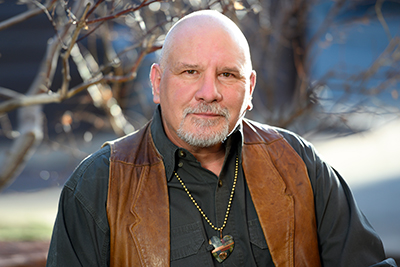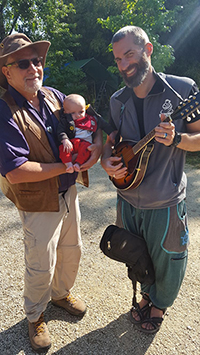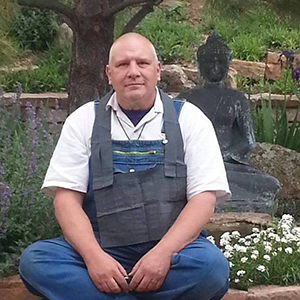A Little About Myself
 When my father was 16 years old, he lied about his age in order to enlist in the US Army, seeing it as his only ticket out of North Georgia. So for a portion of my young life, I was a military brat, traveling often and living in Spain, California, and rural Appalachia.
When my father was 16 years old, he lied about his age in order to enlist in the US Army, seeing it as his only ticket out of North Georgia. So for a portion of my young life, I was a military brat, traveling often and living in Spain, California, and rural Appalachia.
That quickly introduced me to the notion of otherness and the isolating effect it can have on individuals. Moreover, I was the black sheep of the family. So I understand what it can feel like to be an outsider.
I suppose my father’s Viking ancestry instilled in me my altruistic loyalty to those whom I love. And the strong-willed nature of my Cherokee-blooded grandmother taught me the value of sacrifice when freely given. The resulting combination of culture and values instilled in me an altruistic sense of loyalty and sacrifice for those I love.
So when my father fell victim to PTSD and grew emotionally detached because of the gruesome experiences he suffered in Europe’s Black Forest, I became a child of duty. I assumed the role of caregiver. And as my mother looked to alcohol instead of to my emotionally unavailable father, it left me without much of a place to turn to for solace. I suppose that’s why I spent most of my early life buried in books. The characters in those stories felt like the only people I could relate to.
It was when I first held my infant cousins in my arms that I knew without a doubt that I wanted to be a father. In subsequent years, I had my own biological children as well as fostered many young children who were in need of love and stability, just like I had yearned for in my youth. I learned that there is no cause you should be more invested in than raising a child. I suppose it was my way of trying to instill into the world the stability and love that I had so longed for in my youth.
Raising my children was difficult enough. When my best friend died of AIDS, my children were taken from me. This proved to be the darkest and lowest point of my life. I had lost my children to intolerance, teachers to time, and friends and loved ones to the epidemic.
 I was broken and alone.
I was broken and alone.
My Journey Of Recovery
After losing my children for a while, I felt like no one was hearing me—partially because they couldn’t understand, but mostly because they couldn’t bear that pain for me.
After years of reaching for help that was never there, I met someone who would change my life forever. I had sought refuge for my pain and turmoil in a Buddhist monastery nestled in a valley in northern California. That’s where I met Jack Kornfield, a Buddhist psychologist and teacher, who gave me some turning words. The fact that one person heard me, in the midst of my overwhelming suffering and darkness, helped me find the internal strength to dig myself out of despair. I began to learn how to turn suffering into an opportunity for change.
During my year in residency at the monastery, the abbot noticed early my penchant for chattiness and my desire to intervene in others’ suffering. He suggested that I embrace those qualities that made me different from other monks and put them to work in the world helping others. As I continued my healing, another teacher suggested that I go into social work as a therapist so that I had a way of utilizing my strengths and desire to heal others.
After over a decade of dedication, I finally became both a Zen priest and licensed clinical social worker. My approach to helping others is inspired by the same altruistic loyalty, compassion, and reflection of hope that facilitated my own emotional and spiritual healing.
My Healing Philosophy
I truly believe that there are few things more sacred than standing with someone in the darkness amidst their pain until they are able to see you have been holding for them the light. That’s how I regard each individual who honors me with the chance to ease their suffering.
Rather than attacking most issues as pathologies, I prefer to regard them as opportunities for self-growth. To quote Geneen Roth, “Another Fucking Growth Opportunity, (AFGO)”. As a trauma-informed therapist, I know that the neurology of compassion can provide effective techniques for profound healing. I often use the deep tools of mystic poetry, silly songs and mantra practice as part of an eclectic, holistic healing experience that is inspired by the mindfulness tradition of my monastery, wisdom traditions, and modern neuroscience—the very  things that have helped me through my own dark times.
things that have helped me through my own dark times.
I care deeply for others and understand the value of stability in relationships as well as the personal need for purpose and meaning. I have an intimate understanding of anxiety and depression, as well as grief and loss. And I have experience in helping those who are dealing with ADHD or learning disabilities. I also offer couples counseling for traditional and non-traditional relationships; I have been in both. Additionally, I train and supervise other clinicians who need help navigating, and even surviving, aspects of providing comfort to others. I integrate mindfulness, self-compassion, and emotional awareness into my practice for profound and sustainable healing.
I Can Stand With You
Whatever your situation may be, whatever your uncertainty and suffering, I am absolutely certain that things will change. I would be honored to advise if you want a guide to direct you toward your goals. Ideally, I am interested in meeting you in person; however, if needed, I also offer teletherapy. If you are in pain, looking for purpose or simply desiring someone to talk to, I encourage you to call (970) 391-7220 to see how I may be able to help.